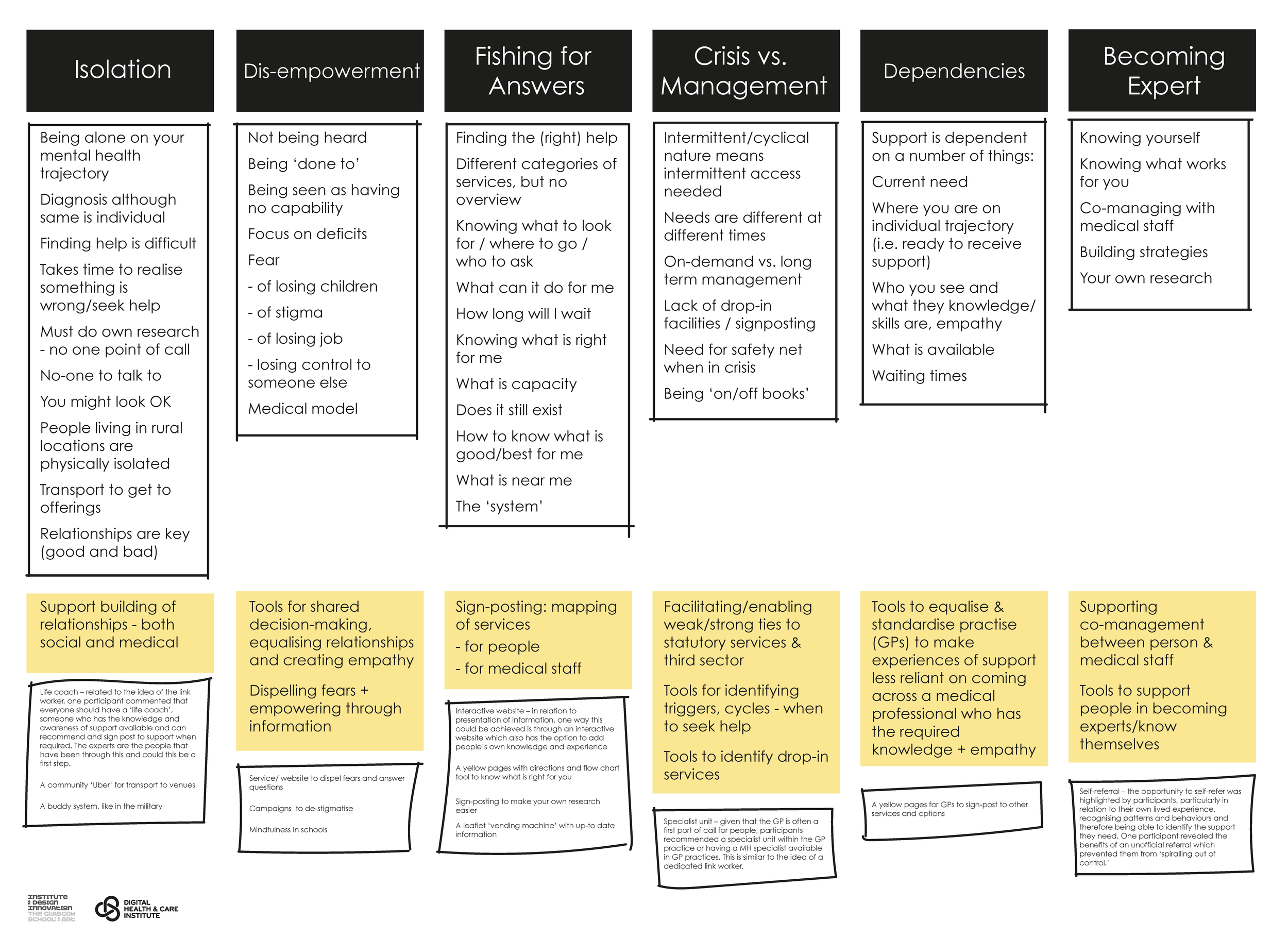Mental Health Innovation
Background
The project aimed to understand the landscape of mental health services in Scotland towards identifying preferable forms of support and opportunities for digital interventions and new ways of providing support, from the perspectives of people, families, carers and service providers. Design researchers at The Glasgow School of Art worked together with people with lived experience of mental health services to understand the journey of finding support, experiencing support and thriving. Shorter public engagement events were also held in order to reach members of the public who do not currently access mental health services but may do so in the future, as well as gather insights from a wide range of people into any experience of mental health support, forms of self-care and preferable support options. A new concept for a digital resource to support access to mental health support emerged. The project engaged with people across Scotland in order to engage a wider public in the conversation around Mental Health support.
The project involves partnership with University of Edinburgh, University of Glasgow, NHS 24, Mydex CIC and Tactuum. The findings of the project will inform the development of digital services for mental health and wellbeing being progressed by NHS 24.
Project Aim
The aim of this project is to understand the landscape of Mental Health (MH) services towards identifying preferable forms of support and opportunities for digital interventions and new ways of providing support, from the perspectives of citizens, families, carers and those delivering support.
The project focussed on three areas: Citizen Journeys, Peer Support and Self Care, to understand how people find, access and experience support for mental health.
Methods
Public engagement: Pop-up approach
Creative engagement with members of the public was designed using a pop-up approach (Teal and French, 2016). A pop-up approach was employed in order to reach members of the public who do not necessarily currently access mental health services, as well as a wide range of citizens and carers to gather insights into any experience of mental health support, forms of self-care and preferable support options. Pop-ups were held in locations across the North East of Scotland at organised public events. Conversations started with general questions regarding wellbeing, e.g. ‘what keeps you well?’, leading to more focussed questions around how people look after their mental health.
Participatory mapping workshops
Mapping workshops using designed tools were employed to understand access to and experiences of people who are currently accessing mental health services. The workshops provided a safe, collaborative space for participants to share their experiences of accessing and receiving support for mental health. Participants were supported to map their experiences individually or in small groups to understand the journey of finding, receiving support and thriving (see Figure 1). The mapping also provided a way to identify needs and opportunities for new forms of support, and to further understand the role of digital mental health services (challenges and opportunities) and what the expectations would be from digital mental health services.
findings
Insights generated through each of the design engagement activities were clustered thematically per engagement. The insights generated across the engagements were then analysed thematically to identify emerging and recurring themes across all activities.
Finding, experiencing and thriving
Participants tended to relate their experiences in a narrative style (beginning – middle – end), and this tended to naturally cluster into three phases, which we described as ‘finding support’, ‘experiencing support’, and ‘thriving’.
key themes and areas of opportunity
Throughout the engagement process, participants identified opportunities for change and generated solutions. Six thematic areas emerged which also identified key challenge areas.
opportunities for digital: simple signposting concept
The key insights and themes emerging across the project led to the design of a concept that aims to overcome many of the challenges experienced when searching for mental health support. The concept also addresses the need to shift to a more preventative and proactive model of mental health that supports aims to support people to overcome fears when searching for support, provide ‘ways in’ to services, whilst removing the stigma which is often experienced in relation to mental health. The concept offers a way to enable people to find the right support they need at the time by showing a map of community services, and a map of wellbeing (self-care); and providing tools to support people in how to ask for help, how to search online for local contacts, information, and offering stories shared by others with lived experience. The concept of Simple Signposting also helps people to prepare for engaging with services by providing information of what to expect from the services and support available.
For more information contact:
Dr Tara French | t.french@gsa.ac.uk
Gemma Teal | g.teal@gsa.ac.uk
Tine Thorup





